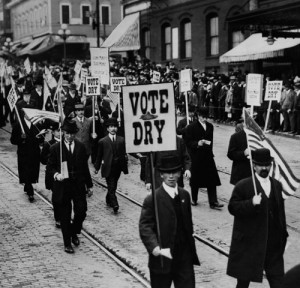 The new American history epic from Ken Burns tackles an illuminating chapter when Congress rose up to deny its people a freedom in a Constitutional amendment, rather than guarantee one.
The new American history epic from Ken Burns tackles an illuminating chapter when Congress rose up to deny its people a freedom in a Constitutional amendment, rather than guarantee one.
It was the Volstead Act which brought prohibition to America, and in doing so helped establish organized crime, made criminals of every citizen with a bottle or a speakeasy and actually resulted in people drinking more after it was banned than they did before.
And fighting for the ban also had its after-effects – the rise of women and their ability to vote (crucial to passing prohibition), the establishment of the income tax as a way to fund government such that it didn’t depend on the liquor tax that provided such a percentage of it.
And of course, there are dozens of fascinating stories of the people who fought for and against it, the business-minded crooks that rose in the face of it, and those who helped turn the thing over a decade later.
Burns hasn’t met a story he didn’t want to make part of the film. So his new epic “Prohibition” (PBS, 8 p.m.) lasts about as long as the era did. Or, at more than five hours, it may only seem so.
The trouble may be that there is a very entertaining re-enactment occurring at the same time on HBO in “Boardwalk Empire.” And that Daniel Okrent’s first rate history of prohibition, “Last Call” covered the era exhaustively and the kind of detail that Burns couldn’t even hope to cover.
Okrent, wisely, is a talking head in the film, and though his own research was independent of Burns, it almost seems like the film and book are two sides of the same coin.
“We were actually working on the film at the same time Dan was working on his book,” says Burns’ collaborator on the film, Lynn Novick. “We didn’t have the book itself to draw from as a source, as a finished work. So we were basically sharing — Dan was sharing his work in progress. We were finding some things and sharing transcripts of interviews with him that he could use. So it was sort of a collaboration.”
But, yes, much had to be left out, she said. “We know a film, even a six-hour film, just barely skims the surface of what you can do even in a very long magazine article. So we really just had to pick the few stories we thought we could tell well and try to do them in enough depth that you could understand some of the themes and issues we were interested in bringing out. So we couldn’t pick every bootlegger story, of which there are an uncounted number.”
Unlike earlier films by Burns and Novick, there was not only plentiful film footage around to re-use, but also some very old people who remember the era as children, when in some cases their families built stills and made their own hooch.
“There’s tremendous humanity in hearing someone tell you that his father was a bootlegger and they delivered his wares to the United States Capitol,” Novick says.
“We had the great good fortune, while he was still a sitting Justice giving a very, very rare public interview, to interview Justice John Paul Stevens a year or so before he retired from the bench, who spoke about his own teetotaling family in Chicago, a Chicago of Al Capone,” Burns said.
And yet there is a lot of that other Burns trademark – famous voices taking up the letters or statements of historical figures.
“We have Sam Waterston and Tom Hanks and Patty Clarkson and Amy Madigan and Frances Sternhagen and Blythe Danner and Paul Giamatti and Oliver Platt,” Burns says.
And narrating once more is Peter Coyote, he of the iPad commercials, who has the ability to make every sentence in Geoffrey Ward’s script sound like a declarative statement.
“He’s one of our favorite voices,” Burns says of Coyote. “He inhabits the words of our narration that our writers and we work in the editing room, and we love the way he attacks it and embodies what we want.”
“Prohibition” begins today at 8 p.m. on PBS. Check local listings.